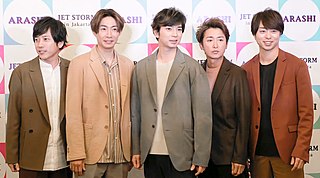Related Research Articles

Queen of Hip-Pop is the seventh studio album by Japanese recording artist Namie Amuro. It was released on July 13, 2005, by Avex Trax. The album's lyrical content, composing and arrangement was handled by multiple music collaborators, such as Nao'ymt, Sugi-V, Michico, Tricky Stewart, T.Kura, among many others. It is her second full-length urban contemporary record, and is made up of songs of various musical genres. Amuro uses the term "hip-pop" to describe the music on the album because it fuses pop music with other genres including R&B and hip-hop music. Three different formats were released to promote the album: a standalone CD, a limited edition Playbutton, and a digital download.

The discography of Japanese recording artist Namie Amuro contains 12 studio albums, 7 compilation albums, 47 singles, 10 live albums, 14 video albums and 102 music videos. Amuro has also collaborated with Verbal of M-Flo and Ryōsuke Imai for her Suite Chic project.

The discography of the Japanese girl group Morning Musume consists of sixteen studio albums, five compilation albums, and seventy four singles. Ever since its establishment in 1997, the group has experienced frequent line-up changes, and currently consists of twelve members: Erina Ikuta (leader), Ayumi Ishida (sub-leader), Sakura Oda (sub-leader), Miki Nonaka, Maria Makino, Akane Haga, Reina Yokoyama, Rio Kitagawa, Homare Okamura, Mei Yamazaki, Rio Sakurai, Haruka Inoue and Ako Yumigeta. The group was formed by Sharam Q vocalist Tsunku, who serves as their lyricist, composer, and producer.

The discography of Japanese pop singer Aya Ueto consists of five studio albums, two compilation albums, sixteen singles, eight video albums and eighteen music videos.

The discography of Arashi, a Japanese boy band, consists of 17 studio albums, six compilation albums, one extended play, 58 singles, four promotional singles, 25 concert videos and two video albums. Arashi has also released 82 music videos, including "All or Nothing", "Lucky Man", "Mada Minu Sekai e", "P・A・R・A・D・O・X", "Kokoro no Sora", "Don't You Get It", "Mikan", and "5x20".

2AM is a South Korean boy band, that consists of Jo Kwon, Lee Chang-min, Lim Seul-ong, and Jeong Jin-woon. The band was formed by JYP Entertainment through the Mnet documentary Hot Blood, which spawned the eleven-member boy band One Day; 2AM primarily perform ballad songs while their brother group 2PM performed more dance-focused music. With the addition of Changmin from Big Hit Entertainment, now known as Big Hit Music, the group was co-managed by JYP and Big Hit from 2008 to 2014. They officially debuted on July 11, 2008, on KBS' Music Bank, performing their debut single "This Song". The group also debuted in Japan with the single "Never Let You Go: Shindemo Hanasanai" in January 2012.

Past<Future is the ninth studio album by Japanese pop singer Namie Amuro. It was released on December 16, 2009, through Avex Trax. This was her first original album to be released in two and a half years. The record came after the release of her blockbuster greatest hits album Best Fiction (2008), which sold over a million copies. Unlike her previous studio albums, Queen of Hip-Pop (2005) and Play (2007), Past<Future features a more electropop and synth-pop sound that was prevalent in the western music charts at the time.

The following is the discography of the South Korean dance-pop boy group MBLAQ which consists of one studio album, eight extended plays (EPs), two compilation albums, and twenty-one singles. MBLAQ have been in the music business ever since making their live debut on Mnet's M! Countdown with their debut track, "Oh Yeah" on October 14, 2009.
The discography of Japanese recording artist Meisa Kuroki consists of two studio albums, two extended plays, five singles, two digital singles and nine music videos.

The discography of the South Korean girl group, Secret, consists of two studio albums, six mini albums, sixteen singles, twenty music videos, and one soundtrack.
The discography of Hey! Say! JUMP features nine studio albums, twenty-eight singles and forty-one music videos, all released through J Storm. The group activities started when the temporary five-member group Hey! Say! 7 were put together to provide the theme song for the anime Lovely Complex. The original members were Yuya Takaki, Daiki Arioka, Ryosuke Yamada, Yuto Nakajima, Yuri Chinen. The five Hey! Say! 7 members were later joined by another four idols, Kota Yabu, Kei Inoo, Hikaru Yaotome and Keito Okamoto, thus creating the group Hey! Say! JUMP, the agency's largest group in history. The group made their CD debut through "Ultra Music Power" which topped the Oricon singles chart. Hey! Say! JUMP released their first full length studio album, JUMP No. 1 on July 7, 2010.
The following is the discography of the South Korean boy band Supernova which consists of ten studio albums, one live album, six compilation albums, one extended play, and thirty-three singles. Known as Choshinsei for their Japanese releases, the group debuted in 2007 with the single "Hit" from their album The Beautiful Stardust in South Korea.
The discography of Japanese actress and singer-songwriter Takako Matsu includes ten studio, three compilation, two live, seven video albums, twenty-one singles, and twenty music videos. Born into a family of actors, Matsu made her debut as a stage performer before her roles in TV dramas and films. That year she released her first single, "Ashita, Haru ga Kitara", which peaked at number 8 on the Oricon Singles Chart and was certified platinum by the Recording Industry Association of Japan (RIAJ) for shipments of 400,000 copies. Matsu's debut album, Sora no Kagami, peaked at number 4 on the Oricon Albums Chart. Selling over 300,000 copies, it earned a platinum certification from the RIAJ and Matsu was named Best New Artist of the Year at the 12th Japan Gold Disc Awards.
The discography of Japanese pop duo Dreams Come True consists of 20 studio albums, 6 compilation albums, 17 video albums, and numerous singles. The band was formed in 1988 by Miwa Yoshida, Masato Nakamura, and Takahiro Nishikawa as Cha-Cha & Audrey's Project, which was later changed to Dreams Come True. The first single "Anata ni Aitakute" did not chart, but their eponymous debut album sold over a million copies in Japan and was certified Million by the Recording Industry Association of Japan (RIAJ). The follow-up albums also performed well on the charts, with the 1989 release Love Goes On... lingering on the Oricon Albums Chart for four years. The group's fifth studio album The Swinging Star (1992) was at one point, the best-selling album in Japan, shifting over 3.7 million copies in the country.

The discography of Japanese musician, LiSA includes 6 studio albums, 2 compilation albums, 3 extended plays, 19 singles, and 5 video albums. LiSA debuted in 2010 as a part of Girls Dead Monster, a musical group featured in the anime Angel Beats!, an anime featuring a high school rock band. LiSA recorded music as the singing voice for the character Yui, and released her first single as a part of the group, "Thousand Enemies", in May 2010 through Key Sounds Label. In June 2010, Girls Dead Monster released Keep the Beats!, an album entirely composed of songs sung by LiSA. The album was commercially successful; certified gold by the Recording Industry Association of Japan.
Japanese idol group Sakura Gakuin has released eleven studio albums, one compilation album, fifteen video albums, thirty-four music videos, and thirteen singles. Seven more singles and nine more music videos have been released by sub-units, including those by the band Babymetal released prior to March 2013. Studio albums are released annually, under the supertitle Sakura Gakuin [Year] Nendo.

"Aiaiai" is a song by Japanese singer-songwriter Miliyah Kato from her sixth studio album, True Lovers (2012). The song was written by Kato, who handled the production alongside Yoshiaki Ohnishi. The song served as the theme song for the Canadian-American television series The Firm in Japan, which was aired from 5 June 2012 on AXN Mystery, one day ahead of the single's release date. The single was released for the two versions of CD and digital download on 6 June 2012 through Mastersix Foundation as the third single from True Lovers. Ahead of the official release, the short version of the song was released on 16 May 2012 as a ringtone.

"Yūsha Tachi" is a song by Japanese singer-songwriter Miliyah Kato from her second compilation album M Best (2011) and her sixth studio album True Lovers (2012). The song was written by Kato herself, while the production was done by Kato's frequent collaborator, Yuichiro Goto. The single was released for the two versions of CD and digital download on 16 March 2011 through Mastersix Foundation as the lead single from M Best. Ahead of its official release, the short version of the song was released on 2 March 2011 as a ringtone.

Japanese rock band ONE OK ROCK has released thirty-five music videos and fourteen video albums. The band and its music have also appeared in various television shows, commercials, and films.
References
- ↑ ミュージックビデオサーチ. Space Shower TV (in Japanese). Space Shower Networks. September 14, 2005. Retrieved September 10, 2015.
- ↑ ミュージックビデオサーチ. Space Shower TV (in Japanese). Space Shower Networks. October 5, 2005. Retrieved September 10, 2015.
- ↑ ミュージックビデオサーチ. Space Shower TV (in Japanese). Space Shower Networks. November 16, 2005. Retrieved September 10, 2015.
- ↑ ミュージックビデオサーチ. Space Shower TV (in Japanese). Space Shower Networks. December 7, 2005. Retrieved September 10, 2015.
- ↑ ミュージックビデオサーチ. Space Shower TV (in Japanese). Space Shower Networks. February 15, 2006. Retrieved September 10, 2015.
- ↑ ミュージックビデオサーチ. Space Shower TV (in Japanese). Space Shower Networks. March 23, 2006. Retrieved September 10, 2015.
- ↑ ミュージックビデオサーチ. Space Shower TV (in Japanese). Space Shower Networks. May 31, 2006. Retrieved September 10, 2015.
- ↑ ミュージックビデオサーチ. Space Shower TV (in Japanese). Space Shower Networks. July 19, 2006. Retrieved September 10, 2015.
- ↑ ミュージックビデオサーチ. Space Shower TV (in Japanese). Space Shower Networks. July 19, 2006. Retrieved September 10, 2015.
- ↑ ミュージックビデオサーチ. Space Shower TV (in Japanese). Space Shower Networks. August 30, 2006. Retrieved September 10, 2015.
- ↑ ミュージックビデオサーチ. Space Shower TV (in Japanese). Space Shower Networks. September 6, 2006. Retrieved September 10, 2015.
- ↑ ミュージックビデオサーチ. Space Shower TV (in Japanese). Space Shower Networks. November 15, 2006. Retrieved September 10, 2015.
- ↑ ミュージックビデオサーチ. Space Shower TV (in Japanese). Space Shower Networks. December 6, 2006. Retrieved September 10, 2015.
- ↑ ミュージックビデオサーチ. Space Shower TV (in Japanese). Space Shower Networks. February 7, 2007. Retrieved September 10, 2015.
- ↑ ミュージックビデオサーチ. Space Shower TV (in Japanese). Space Shower Networks. April 18, 2007. Retrieved September 10, 2015.
- ↑ ミュージックビデオサーチ. Space Shower TV (in Japanese). Space Shower Networks. July 25, 2007. Retrieved September 10, 2015.
- ↑ ミュージックビデオサーチ. Space Shower TV (in Japanese). Space Shower Networks. May 16, 2007. Retrieved September 10, 2015.
- ↑ ミュージックビデオサーチ. Space Shower TV (in Japanese). Space Shower Networks. July 18, 2007. Retrieved September 10, 2015.
- ↑ ミュージックビデオサーチ. Space Shower TV (in Japanese). Space Shower Networks. September 19, 2007. Retrieved September 10, 2015.
- ↑ ミュージックビデオサーチ. Space Shower TV (in Japanese). Space Shower Networks. January 9, 2008. Retrieved September 10, 2015.
- ↑ ミュージックビデオサーチ. Space Shower TV (in Japanese). Space Shower Networks. May 28, 2008. Retrieved September 10, 2015.
- ↑ ミュージックビデオサーチ. Space Shower TV (in Japanese). Space Shower Networks. June 18, 2008. Retrieved September 10, 2015.
- ↑ ミュージックビデオサーチ. Space Shower TV (in Japanese). Space Shower Networks. August 27, 2008. Retrieved September 10, 2015.
- ↑ ミュージックビデオサーチ. Space Shower TV (in Japanese). Space Shower Networks. August 27, 2008. Retrieved September 10, 2015.
- ↑ ミュージックビデオサーチ. Space Shower TV (in Japanese). Space Shower Networks. January 14, 2009. Retrieved September 10, 2015.
- ↑ ミュージックビデオサーチ. Space Shower TV (in Japanese). Space Shower Networks. February 11, 2009. Retrieved September 10, 2015.
- ↑ ミュージックビデオサーチ. Space Shower TV (in Japanese). Space Shower Networks. July 29, 2009. Retrieved September 10, 2015.
- ↑ ミュージックビデオサーチ. Space Shower TV (in Japanese). Space Shower Networks. July 29, 2009. Retrieved September 10, 2015.
- ↑ ミュージックビデオサーチ. Space Shower TV (in Japanese). Space Shower Networks. October 21, 2009. Retrieved September 10, 2015.
- ↑ ミュージックビデオサーチ. Space Shower TV (in Japanese). Space Shower Networks. October 21, 2009. Retrieved September 10, 2015.
- ↑ ミュージックビデオサーチ. Space Shower TV (in Japanese). Space Shower Networks. October 21, 2009. Retrieved September 10, 2015.
- ↑ ミュージックビデオサーチ. Space Shower TV (in Japanese). Space Shower Networks. January 27, 2010. Retrieved September 10, 2015.
- ↑ ミュージックビデオサーチ. Space Shower TV (in Japanese). Space Shower Networks. February 27, 2010. Retrieved September 10, 2015.
- ↑ ミュージックビデオサーチ. Space Shower TV (in Japanese). Space Shower Networks. May 5, 2010. Retrieved September 10, 2015.
- ↑ ミュージックビデオサーチ. Space Shower TV (in Japanese). Space Shower Networks. May 5, 2010. Retrieved September 10, 2015.
- ↑ ミュージックビデオサーチ. Space Shower TV (in Japanese). Space Shower Networks. August 18, 2010. Retrieved September 10, 2015.
- ↑ ミュージックビデオサーチ. Space Shower TV (in Japanese). Space Shower Networks. November 17, 2010. Retrieved September 10, 2015.
- ↑ ミュージックビデオサーチ. Space Shower TV (in Japanese). Space Shower Networks. February 16, 2011. Retrieved September 10, 2015.
- ↑ ミュージックビデオサーチ. Space Shower TV (in Japanese). Space Shower Networks. February 16, 2011. Retrieved September 10, 2015.
- ↑ ミュージックビデオサーチ. Space Shower TV (in Japanese). Space Shower Networks. June 22, 2011. Retrieved September 10, 2015.
- ↑ ミュージックビデオサーチ. Space Shower TV (in Japanese). Space Shower Networks. August 31, 2011. Retrieved September 10, 2015.
- ↑ ミュージックビデオサーチ. Space Shower TV (in Japanese). Space Shower Networks. November 16, 2011. Retrieved September 10, 2015.
- ↑ ミュージックビデオサーチ. Space Shower TV (in Japanese). Space Shower Networks. October 31, 2012. Retrieved September 10, 2015.
- ↑ ミュージックビデオサーチ. Space Shower TV (in Japanese). Space Shower Networks. January 23, 2013. Retrieved September 10, 2015.
- ↑ ミュージックビデオサーチ. Space Shower TV (in Japanese). Space Shower Networks. June 26, 2013. Retrieved September 10, 2015.
- ↑ ミュージックビデオサーチ. Space Shower TV (in Japanese). Space Shower Networks. February 26, 2014. Retrieved September 10, 2015.
- ↑ ミュージックビデオサーチ. Space Shower TV (in Japanese). Space Shower Networks. March 26, 2014. Retrieved September 10, 2015.
- ↑ ミュージックビデオサーチ. Space Shower TV (in Japanese). Space Shower Networks. July 2, 2014. Retrieved September 10, 2015.
- ↑ ミュージックビデオサーチ. Space Shower TV (in Japanese). Space Shower Networks. July 2, 2014. Retrieved September 10, 2015.
- ↑ ミュージックビデオサーチ. Space Shower TV (in Japanese). Space Shower Networks. September 17, 2014. Retrieved September 10, 2015.
- ↑ ミュージックビデオサーチ. Space Shower TV (in Japanese). Space Shower Networks. February 25, 2015. Retrieved September 10, 2015.
- 1 2 AAAのDVD売上ランキング. Oricon Style (in Japanese). Oricon. Retrieved September 10, 2015.
- ↑ AAAのBlu-ray売上ランキング. Oricon Style (in Japanese). Oricon. Retrieved September 10, 2015.